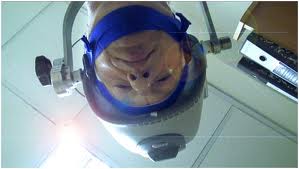UK Premiere / Reel Science
Showing @ Filmhouse 2, Tue 21 June @ 17:45
Nadav Harel / Israel / 2010 / 60 min / English
Using electric therapies as a treatment for brain disorders is highly controversial, partly as a result of popular culture and horrific examples in films and literature such as One Flew Over the Cuckoo’s Nest. But according to contemporary studies, it’s the most effective way of treating such diseases, and this documentary is out to prove it.
Featuring four patients with different brain disorders, director Nadav Harel charts their progress from suffering into the treatment phase, before charting their recovery and beyond. Intertwined with interviews from relevant doctors and surgeons, the narrative is simple and straightforward. Harel pulls no punches; he’s not trying to be cinematic or to create a piece of visual art – in fact it would be much more appropriate for TV. The sole purpose of this documentary is to inform and enlighten, its focus all about the patients and their illnesses.
What is interesting is that although all four treatments involve some form of electricity as the primary cure, the more abrasive ones are the ones that are received more casually by the audience than the ‘traditional’ electroconvulsive therapy, which is met with gasps, scoffs and shaking heads. A girl who has a lobotomy to treat her epilepsy and a man who has an electric device permanently inserted into his brain with an internal link to a battery in his abdomen is welcomed as progressive, as medical technology at its very best. Electroconvulsive therapy, whilst disturbing to watch and no doubt traumatising to receive, is actually quite mild in comparison. In all four cases the treatment works, and it’s the electric shock-related treatments that are given the greatest appraisals by their patients. Whilst this film won’t quite convince the world that the horror stories are exactly that – horror stories, it’s illuminating to see the positive side of electroconvulsive therapy and the many benefits it gives to those who had lost hope of recovery.
